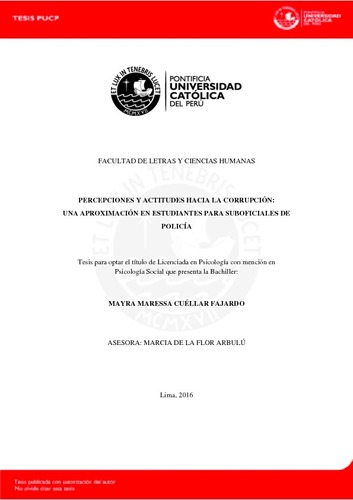| dc.contributor.advisor | Flor Arbulú, Marcia de la | es_ES |
| dc.contributor.author | Cuéllar Fajardo, Mayra Maressa | es_ES |
| dc.date.accessioned | 2016-11-11T21:33:43Z | es_ES |
| dc.date.available | 2016-11-11T21:33:43Z | es_ES |
| dc.date.created | 2016 | es_ES |
| dc.date.issued | 2016-11-11 | es_ES |
| dc.identifier.uri | http://hdl.handle.net/20.500.12404/7463 | |
| dc.description.abstract | El presente estudio, de enfoque cualitativo y exploratorio, se propuso conocer y analizar las percepciones y actitudes de las y los estudiantes para suboficiales de policía respecto a las características y motivaciones de las personas que cometen corrupción, cuáles son los efectos de dicho fenómeno y qué soluciones deberían plantearse. Se entrevistó a estudiantes varones (n=8) y mujeres (n=8) de dos Escuelas Técnicas Superiores de Suboficiales de Lima metropolitana. Los resultados mostraron que las características de las personas que cometen corrupción se asocian a valores individualistas y materialistas. El sector de actividad profesional (público o privado), el nivel socioeconómico, los estereotipos de género y los procesos de influencia social podrían incidir en su manifestación. Se identificaron efectos sociales, punitivos, psíquicos y emocionales de la corrupción. Como soluciones se destacaron el control de la impunidad, la educación, la vigilancia ciudadana, y la transparencia en el ejercicio de las funciones. | es_ES |
| dc.description.abstract | This study, which takes a qualitative and exploratory approach, aims to understand and analyze the perceptions and attitudes of sub-officer police students vis-a-vis the characteristics and motivations of those who engage in corruption, what the effects of said phenomenon are, and what solutions may exist to combat it. Interviews were conducted with male (n=8) and female (n=8) students of two Superior Technical Schools of sub-officials in metropolitan Lima. The results showed that the characteristics of those who engage in corruption are associated with individualistic and materialistic values. The professional sector in which one works (private or public), socio-economic level, gender stereotypes, and processes of social influence may affect how corruption manifests. Social, punitive, psychological and emotional effects of corruption were identified. Students proposed as solutions control of impunity, education, citizen oversight, and transparency in the exercise of functions. | es_ES |
| dc.language.iso | spa | es_ES |
| dc.publisher | Pontificia Universidad Católica del Perú | es_ES |
| dc.rights | Atribución-NoComercial-SinDerivadas 2.5 Perú | * |
| dc.rights | info:eu-repo/semantics/openAccess | es_ES |
| dc.rights.uri | http://creativecommons.org/licenses/by-nc-nd/2.5/pe/ | * |
| dc.subject | Corrupción policial. | es_ES |
| dc.subject | Corrupción. | es_ES |
| dc.subject | Policía--Perú. | es_ES |
| dc.title | Percepciones y actitudes hacia la corrupción : una aproximación en estudiantes para suboficiales de policía | es_ES |
| dc.type | info:eu-repo/semantics/bachelorThesis | es_ES |
| thesis.degree.name | Licenciado en Psicología Social | es_ES |
| thesis.degree.level | Título Profesional | es_ES |
| thesis.degree.grantor | Pontificia Universidad Católica del Perú. Facultad de Letras y Ciencias Humanas. | es_ES |
| thesis.degree.discipline | Psicología Social | es_ES |
| renati.discipline | 313066 | es_ES |
| renati.level | https://purl.org/pe-repo/renati/level#tituloProfesional | es_ES |
| renati.type | http://purl.org/pe-repo/renati/type#tesis | es_ES |
| dc.publisher.country | PE | es_ES |
| dc.subject.ocde | http://purl.org/pe-repo/ocde/ford#5.01.00 | es_ES |






